|
AS PROSE GOES
|
|
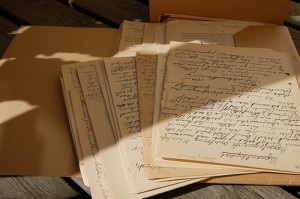 |
Granite or marble monument In time, is dust again. Printed pages are permanent When written by noble Men. But what of excited electrons Where message is keyed on today. When main frames collapse, the ions Will carry our thoughts fast away. |
NEEDFUL WORKMy job at the steel mill was one of those simple but very important occupations called hostling. During the working day shift, narrow-gauge locomotives trudge along tracks which connect the different mills. Each miniature engine trails a snake-like string of flatcars loaded with glowing ingots or ladle cars filled with molten metal. When these small workhorses are put on a siding for the night, it is time for the hostler to begin his duties. I worked along with an old man. It was our responsibility to insure that the engines or dinkies, as we called them, were in good condition for the next day's labor. The essential part was keeping the fires burning. Curly and I would make our rounds about every two hours, feeding shovelsful of coal to the hungry flames. If the boiler thirsted, we would answer its needs with a satisfying torrent of water from a large overhead pipe. An empty coal car meant a trip to the coal bins where a noisy stream of the black fuel slid down the chute and rattled against the steel sides of the car. Occasionally, one of our charges would break down, whereupon with wrench and hammer we made quick repairs. As I look back on this, my first occupation, I cannot help but feel a bit of pride. True, it was dirty, sweaty, tiring, cold, unhealthy work but without the efforts of the lowly hostler, the production of steel would be greatly reduced. |
| NO CATCH |
|
|
| ANTIDOTE FOR A GRAY DAY |
|
Take a good look at the sky. All you see is dark, gloomy, foreboding
clouds blotting out the joyous blue beyond. If that is all that you
see, then you have yet to learn to project yourself above the clouds.
This is easy if you have ever experienced the wonderful thrill of
taking off from the earth in a plane during
*Note - In April of 2007, I came across the following article in which another radio operator, who had flown in the same sky as I, evidently was similarly impressed. He surely did a better job of self-expression than I attempted. Sadly he met with misfortune upon leaving "our sky." WORLD ABOVE CLOUDS TOLD BY MISSING G.I. Roundup Staff Article A short time ago Radio Operator Joe Zuber went down over The Hump. His mates of the 1330th BU in Assam sadly sorted his personnel belongings. Among other things they found the following, written in pencil on both sides of a blank radio sheet and evidently composed on a previous flight: "If it were only possible to put on paper the greatness and beauty of the world up here above milky white clouds, I would want to be the one entrusted with such an undertaking." "Up here just a score of thousand feet it seems impossible that there below exists strife and desolation, while here the black touch of mankind has done nothing to mar the beauty which is God." 'CLEAN, PURE WORLD' "The sun rises over a clean, pure world of soft, fluffy clouds, and sets over the same each evening. One feels like an intruder stepping into a place of peace and solitude that could exist in only one place "Could it be that here is where the souls of the pure in heart go to escape the darkness of the earth? "I
rather think not, or God would not allow the waves carrying the filth
and lies broadcast by enemy countries to filter through and cause the
spoil. "I would stay here forever, but my body is still alive and I grow hungry for the things of the earth and must return down there; from the purest white to the darkness once more." WE'LL SEND IT Pfc. Thomas C. Beaman, one of the G.I.'s who sorted
Joe Zuber's belongings, sent the piece to the Roundup. He
wrote: "if this appears in the publication we'd all appreciate it up
here if you'd send a copy of it to his wife and mother in Williamsport,
Pa. He has a two-month-old son there he'd never seen. They might want
to show it to the kid some day to let him know what kind of guy his old
man was." We'll send the copy, soldier. |
ACTOR
It was time to show the guests his large collection of Indian relics. I
had seen Grandad go through his subtle histrionics many times before,
but I tagged along through force of habit. There was no doubt that he
was an authority on Indian lore since he himself was an adopted chief
of the Sioux tribe. by grandson R.A.Stumpf |
THE TESTIMONIALSometime in the 1930's, the couple was not getting along too well and their marriage was in jeopardy. In due course, the pair approached my minister father for possible guidance. After listening to their problems, Dad suggested that, since the husband was making a living wage, the wife quit her job and concentrate on starting a family. Some months later, Dad met the wife in a department store in Pittsburgh where she was shopping with friends. It was apparent that she was far along in her pregnancy. Rushing excitedly forward and hugging Dad around his neck, she blurted, "Oh, Pastor, I'm so happy! I'm going to have a baby....and no one had more to do with it than you!" It must have been a warm Saturday morning in the mid-thirties. I sometimes accompanied Dad when he made his rounds in downtown Braddock. I think he used these treks to ground himself in community life prior to ascending his pulpit on the day following. He would pop into various establishments and exchange greetings and news with the proprietors. After stopping at such disparate places as the jewelry store and the Republican ward boss's office, we entered the hardware store. After Dad described the item he needed to the owner, we were led down to the basement work and storage area. As he followed the owner, Dad walked by the glass-cutting table. As he did so, his arm side-swiped the sharp edge of a protruding pane of glass. In the instant he saw the bloody gash, Dad gripped the wound with one hand and headed for the stairs. Trailing after him out to the street, I puzzled as to his intent. Without losing stride, my father moved up the sidewalk, went in a doorway, climbed a flight of stairs, and entered .....a doctor's office! In quick time, Dad explained the injury, refused any anesthetic, and told the doctor to start sewing! The stitches were applied in stoic silence. My memory recalls no further details of this case, except that I had gained a hero in my own family. [Note: Added by my sister Cathy: Bob: I loved that story about Dad. He was a tough guy - tougher than he looked! I can remember trips downtown with Dad, too. I remember especially the bank (when banks LOOKED like banks). High ceilings, marble, and white tile floors. And barred teller's windows. Isn't it interesting that he took each of us on those little excursions separately? That was before they had books telling parents to spend one-on-one time with their kids. He just did it instinctively, I guess. A good Dad.] While
eating at diners and the like, I often see waitresses scurrying around
with bottles of ketchup in their hands. Such sights trigger scenes I
recall where I was the actor on stage. Upon my arrival at a camp for
roadbuilders on my trip to Alaska in 1947, I ended up doing KP in the
kitchen tent. "Cookie" and I were charged with feeding a couple dozen
hungry men who surveyed land, cleared forest, pushed earth and spread
gravel seven days a week. May 2008 |
| SCHOOL DAZE | |
 |
Dad told of the time in school when he waited in hiding at the foot of a staircase ready to give a favorite girl a surprise kiss. When the coup was complete, he found he had kissed one of his lady teachers by mistake. After school, Dad went home and explained to Grandfather what had happened and asked him how he could tell his teacher about the mixup. Grandfather, who evidently knew something about how the female mind operates, advised, "Never let her know it was a mistake, son, or you'll really be in trouble." |
RAISING CANE
Sometime about 1908, my father was walking along the street near the
center of York, Pennsylvania. In his attempt at being debonair, this
young blade of twenty had added a sporty cane as an accoutrement to his
dapper clothing. It happened that as he was striding along, he was met
by his father who was also using a cane due to a disability. With a
cursory look at his son and hardly missing a step before moving on, the
elder man said, "Ray, I use a cane because I'm weak in the legs. You
use one because you're weak in the head!" |
DOORWAY TO SUCCESS
The college professor was having a talk with Dad about his potential
personal assets. "Ray, with your bluff and your father's brains, you
could go far." Then shaking his head, he added, "If you only had your
father's brains." |
| RESCUE |
|
From the York _____,Pa. newspaper Note: This location on Codorus Creek is just south of West York; Highland Park is, or was, the area on the north shore of the creek. The exact location of High Rock is unclear. |
| [*Note - An excerpt from
The Parish Telephone, a publication of a York Co., PA group of Lutheran churches (Paradise, Wolf's,
Quickels and Mt. Zion) circa 1914.] p. 5 - A Trip up the River A new name has been added to the list of Lutheran ministers. It is that of Rev. Raymond Neff Stumpf, the old spelling of the name, which the pastor's children have adopted. He was ordained at Jersey Shore, one hundred and thirty miles up the Susquehanna, on May 24, and has already taken charge of two congregations at Smicksburg and Trade City, Pa. It was to witness this event that his father and mother took a delightful trip among the River brethren. Nature at this season hardly is more beautiful in the world than along the great current that divides the Keystone State in two. The buildings, however, do not have as much paint and whitewash as have those of our own county. The people though make a good first impression upon strangers. Those we met treated us royally. We were surprised to find the woods so full of Lutherans. Jersey Shore is a greater Lutheran city than York while Snyder county, in which our schools at Selinsgrove are situated is the banner Lutheran county in the United States. We called at the latter schools to see our Florence who spent the last year there as a music pupil. That county is full of scenes of Indian history where many heroic deeds were done, and where many old pioneers are buried. But we have no space to tell these stories of hardship, bravery, and blood. We came back delighted and refreshed by what we saw and heard and felt among the old and new friends of the north. |
| [*Note - from another issue, p.5] ....Here our cousin, Dr Jacob Walter, has been living and practicing medicine for over a score of years, and for miles round he enjoys an enviable reputation as a citizen and physician. We spent a few hours in his spacious home with his interesting family. He has three lovely daughters who love to visit in York County. A few days later we returned and spent a night with him. Mrs. Walter took us in an auto to see Punxsutawney. It is worth seeing. It has some of the finest roads we ever saw. But we would here remark in passing that the country roads in that part of the state, though hilly, are kept clear of stones and hence are much superior to most of ours. The sight of over eight hundred coke ovens furiously burning and throwing out their smoke, laden with sulphur, over the hills, where not a single blade of grass ever grows, can never be forgotten. One thinks of Dante's inferno, as one looks over this scene of death. The hills not only are bare, but seamed and torn by rains. Yet here children are reared by the dozens, children who never see a flower or even a cabbage plant in garden or home. That Saturday evening we left Punxsutawney with our son Raymond, who had come to meet us, to go to Smicksburg sixteen miles further on. The station is mile and a half from the village. But an auto soon whirled us over the hills to the home of R.C. Robinson, who with his wife and daughter entertained us most graciously over the Lord's Day. Here father preached in son's church in the morning and at Trade City, six miles away, in the afternoon. These are the young preacher's only churches. The membership is something over two hundred and they certainly are kind people, very warmly devoted to their congregations and their young pastor. The prospects for a happy pastorate are very fine indeed. This charge is in Indiana county, and we recalled that Rev. C.J. Deninger preached in that county about sixty years ago, and came from there to found Quickel's Charge. |
|
PRETTY OCTOBER WEDDING at the M'CREIGHT HOME Miss Mary Catherine McCreight becomes the Bride of Rev. Raymond N. Stumpf The beautiful country home of M.I. McCreight, near town, was the scene of a pretty nuptial event this morning when Miss Mary Catherine McCreight became the bride of Rev. Raymond Neff Stumpf, of Smicksburg, Pa. If the old saying holds good that "Blessed is the bride that the sun shines on," Miss McCreight should indeed be happy, for the sun shone brightly and the weather was ideal, and no prettier place than her father's country home could have been selected for this event on this beautiful October day. The wedding had been looked forward to with interest by the many friends of the contracting parties and over one hundred and fifty guests were present, when the ceremony took place. The interior of the house presented a very attractive appearance with its decorations of southern smilax and pink chrysanthemums. Every room was adorned with flowers and potted plants, which gave forth a delightful fragrance. The color scheme of the decorations was pink and white. When the guests had all assembled and while waiting for the bridal party to appear, Mrs. Donald McCreight sang very sweetly a solo entitled "Oh Promise Me." The ceremony occurred in the large reception room, and at 11 o'clock the wedding party came down the stairs and entered the room, to the music of Lohengrin's wedding march as rendered by Bert Lowe. First came the ring bearer, little Rembrandt McCreight, the five year old brother of the bride, looking very pretty in his suit of white velvet. Then came the flower girl, Miss Martha McCreight, the sister of the bride. Then followed the maid of honor, Miss Florence Stumpf, of York, a sister of the groom. Next was the groom accompanied by his best man, Paul Kinports,* of Mount Wolf, Pa. Last came the bride leaning on the arm of her father, Major McCreight, who gave her away.  The bride wore a costume of white crepe de chine and carried a boquet of bride's roses and lilies of the valley. She made a very pretty, attractive bride. Miss Stumpf, the maid of honor, wore pink silk crepe and carried pink roses. Miss Martha McCreight, the flower girl, was attired in a costume of shower lace over pink messaline and carried flowers. Little Rembrandt looked very sweet and handsome in his costume of white velvet. The bridal party gathered under a canopy of southern smilax where the groom's father, Rev. Adam Stump, D.D., of York, awaited them, and who pronounced the words which united the young people in the holy bonds of wedlock. Following the ceremony the couple were showered with congratulations and later an elaborate luncheon was served in the conservatory. Here the color scheme, pink and white, was carried out, and the tables were decorated with pretty flowers. The bride is one of the most popular young ladies in the social circles of this city and has a large number of friends and acquaintances who will wish her any amount of happiness in her newly wedded life. The groom is the son of Dr. Adam Stump, a well known Lutheran pastor at York, Pa. It was while a student at Susquehanna University where he graduated, that he met his future bride and their friendship ripened into love, finally culminating in the event of today. She was also a student at Susquehanna University. The groom is now located at Smicksburg, Pa. where he is pastor of a Lutheran charge which includes Trade City. ---Dubois Express, Oct. 20, 1914 *Note: Paul Kinports also became a Lutheran pastor, first in several Pennsylvania churches, then in Charleston, South Carolina, where he served for many years. |
![]()
WEDDING PRESENT
A young barber in York got married and he and his new bride left town
on their honeymoon. While he was away, his friends completely
refurbished his shop. To top off their work, they tacked a sheriff's
sale sign on the entrance. In due time, the couple returned home. When
the happy barber went to work in the morning, he was confronted by the
legal-looking sign posted on his workplace. Being completely
confounded, he stood outside the door surveying the renovated premises
for quite a while. Finally deciding that it really was HIS shop, he
entered and was soon being 'ribbed' and toasted by his well-wishing
friends. |
HISTORY LESSON
Admittedly, those who make up the personnel of a
bridge construction company are a tough lot. Regardless, on a pretty
spring day, the superintendent who had come up through the ranks
succumbed to the charms of a traveling lady
ANOTHER BRICK STORY 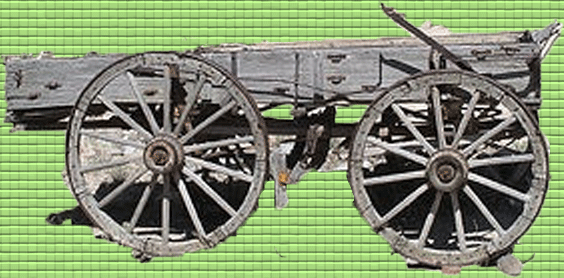 Hearing
nowadays of despicable people, kids included, who do despicable acts
which they evidently do "for fun", reminds me of a "for fun" thing that
Dad related to me. He attended Susquehanna University and was active in
music and sports management. As a student prank, a group of fellows
obtained a farm wagon and a load of bricks. During the night, they
somehow got the wagon to the roof of a major campus building and filled
it with the bricks! Of course, in the morning the sight which the
people beheld caused quite a sensation. All of the construction and the
later dismantling by the students was done with no malice or
destruction. One
of the hazards presented to preachers in accepting dinner invitations
from church members can be documented. My minister father ended up as
dinner guest at the table of one of his parishioners. One item on the
menu was evidently one of the greatest pride to the cook of the house.
Sadly, it was an affront to Dad's palate, but he dutifully feigned a
gracious statement about its goodness. The hostess watched him finish
his portion and promptly and forcefully, with no chance of refusal
allowed, BOUNTIFULLY refilled his dish. Dad barely survived this
culinary ordeal to permit him to relate the story later. My
wife Barb's great uncle, Joe Elder of Fayette, was a successful
bachelor dairy farmer. He was a well-liked citizen with a relaxed
kidding manner tied to his good nature. The tobacco juice produced by
ruminating his "chaw" sometimes escaped to his chin and often on to his
overalls. If, during a visit, people stood around talking, he'd soon
order loudly while grinning, "Sit down. You're wearing out the rug!" |
| CAPTAIN BRADY'S BUSHWHACK |
|
The Indians went into Cumberland County and stole horses and household
goods. They then started for their stronghold in Kittanning. The whites
met together and started in pursuit. They followed the thieves until
they crossed Crooked Creek on Grandfather Andrew McCreight's farm in
Indiana Cou At this juncture, some of the Indians split off from the main body and moved about four miles up Crooked Creek and camped. The remainder continued on the Kittanning Path with the horses and other plunder. About three-fourths of a mile from the creek, they pinned with a thorn a piece of oiled paper to a white oak. It contained these words: "Dear brother, we have got back safe this far." Four miles west of this tree they crossed Plum Creek. When Captain Brady and his comrades arrived at this stream, the muddy water was still in the tracks of the Indians' horses. The pursuers had to wade the creek. Brady said he knew of a ravine and if the robbers did not camp there, they would push through to Kittanning. The settlers followed the trail until they came to the gorge where they found the raiders encamped. Having waded the streams, the pioneers' feet were wet and cold, there being a skiff of snow on the ground. They waited patiently for the Indians to sleep. Then Brady divided his men into three bands. One took the north side of the valley and the second band covered the south side. The captain retained six of his most trusty men as there were seven Indians in the camp. Brady gave orders to his six men not to fire until near enough to singe the eyebrows of the redmen. My grand uncle, Tommy Woods, told the leader he would shoot one Indian through the elbow as he had his elbow resting over the heart of one lying next to him, and another through the heart, which he did. But one man's gun went off prematurely, compelling the rest to shoot before they were as near as ordered. One Indian who was missed, jumped to his feet and ran up the ravine. Brady dropped his gun and ran after him. The parties on each side of the ravine were afraid to fire lest they might shoot their commander. Brady gained on the escapee and threw his tomahawk at him. The ax missed its mark and stuck in a tree. He rapidly gained ground and was reaching for the Indian's collar when he stepped on a dead chestnut limb. Down went Brady and away went the savage who proved to be the cruel, bloodthirsty renegade, Simon Girty. When Girty arrived at Kittanning he related his narrow escape and vowed never to go out against the whites anymore. When the avengers stopped again at Crooked Creek on their way home, Brady proposed that they go with him up the stream to where the remainder of the Indians were. Then they would either kill or capture them. But the men, having secured their property, were anxious to get home to their families. So they went. Brady stayed behind. When he went up to the Cummins place where the encampment was, he found he was greatly outnumbered. He had to give up on his designs and headed back to Cumberland County. Writer unknown
COLORFUL CHARACTERS OF CLARION COUNTY Captain
Samuel J. Brady, founder of Brady's Bend, was said to be the first
white settler in Clarion County. Brady was a notorious scout and Indian
fighter who became popular for feats such as the following: Brady's group crossed the river, killed the Indians, and rescued the prisoners.
|
|
A word of explanation: The following is a transcription of a letter
written by Hannah (Sharp) Leason, oldest sister of Anne Sharp who
married Andrew McCreight who was the grandfather of Major I. McCreight
who was the grandfather of Robert A. Stumpf who is posting this on my
Web page on the internet in 1999. Juxtapose this action with that of
Hannah as she takes up her pen in 1867 to let us know what happened in
1794. Scrubgrass, Butler County, Venango Township. October 26, 1867. I sit down to write some particulars about my father's Death. He was a Militia Captain. He Served under george washington in the revolutionary war. My father Andrew Sharp was married to my Mother Ann Woods in the year 1783 in their native place in Cumberland County pen and with a family of one Child moved to Crooked Creek indiana. This being a new county there was no Chance for Schooling his children. My father after Settling there ten years he was determined on having his children schooled. He Swapt his place for one in Kentucky. My Mother had plenty of friends living there. We moved to blacklick river and got into our boat. We Started in the evening. The water was too low. We had to Land over a night and day. We Started the next day. We got two miles below the falls on the Kiskaminitis river. We Landed. My father had a canoe tied to the side. It got loose going over the falls. Father went back for it. I went out to gather flowers for the Child that was sick. The indians was laying behind a Large tree that had fell. I was at one Side and them at the other Side. When I went into the boat there was a man Came and told us the Indians was Coming. Again the time father was got back all the women and children was in the boat. The men went out to tye up the horses. The Sun was an hour an half high in the evening. They thought it best to go up to Mr. Hall's an stay to morning. When they were tying up the horses Seven Indians fired on them. They were hid behind a Large tree that fell down about fifteen steps off. The first fire they shot fathers right eyebrow off. When he was cutting one end of the boat loose he got a wound in the Left Side, when he was Cutting the other end loose they shot him through the other side. Father got the boat away before they could get in. He Saw an indian among the trees. He Called for his gun. Mother gave it to him. He shot him dead. Mother was smoking. Her pipe was Shot. One man run up to Mr. halls and was safe. The boat got into a whirlpool and went round and round for a while. When the open Side went toward Land they Shot in at us. They followed us twelve miles Down the river. They Called for us to go to them or they would fire again at us. Mrs. Conmer and Son wanted to go out to them. Her husband was laying at her feet. He died the next day. They said they were all kikked and when father told him to desist or he would Shoot him the indians Shot him that moment. He fell across my Mothers feet. There was two dead men and two wounded. One of them died the next morning. There was no woman nor child hurted. They all Lay on the floor. There was twenty in all. They took my fathers horses. The others got theirs. My Mother worked the boat the whole night. We got within nine miles of Pittsburgh again daylight. There was men out on the Land burying some that was killed the Same Day my father was wounded. They came in a canoe to the boat to help us along. One went on before us to pittsburg and had the Doctors ready when we got to pittsburg. Kind neighbors come to us when we got to pittsburg. Father lived forty days after he was wounded. He was willing to die. He said if it had been the will of providence for him to Live to See his Children raised he would have been satisfied. He Left them to the Care of providence who promise to be a husband to the widow and a father to the fatherless. Many a time I went and covered myself up and wept when I heard him moaning when the Doctor was dressing his wounds. He got better and could sit up on the bed and talk to people when they came to see him. They shot the cannons on the fourth of July. The Doctors did not want them to Shoot the Cannons. He said it would make the wounds run. The one in his back began to run. There was one in both Sides. He died the eighth day of July in the forty Second year of his age in the year ninety four. He is buried in Pittsburg. There was no friends to follow his remains to the grave but a younger sister and myself. Mother was not able to go. The youngest Child was eleven days old. There was plenty of neighbors to go. It was a wet day he was buried with the honors of war. After my Mother got well I went with her to the grave yard, and showed her where father was buried. Father went down over the mountains to See his father and Mother before he went away. He bought School books and bibles for all that was able to go to School. He did not live to see his children sent to School. He had a Brother Come to see him when he was laying on his death bed. He went home after Some time. Father sold the boat himself. He knew he would not go down the river any farther. We lived a while in the boat before we moved up to the City. His brother came back again. Father was dead before he got back. His Brother stayed with us till there was wagons Sent for us. We went over the mountains to Cumberland County and lived there three years. When we got there my father had another brother who came to see us. The clothes that was on father when he was wounded Mother showed to him. He looked at every bullet hole that was in them. He wept like a Child. We lived in Cumberland County three years and went to School. We were all good common Scholars but oh it was at the expense of my father's Life. We got our own place back. We moved home. We got along wonderful well. We all lived together. We did not live abroad-, providence was very kind to us and how thankful we ought to be to God for preserving us through Such dangers. It was a party of twelve that went to pittsburg to trade. The people would not trade with them. They got angry and killed all they could that day. There was three men went down wounded. One of them died. The other got well. It was the last war that was in that part of the Country. It was in the year one thousand seven hundred and ninety four when all these things happened. I never had Spite at the indians. They were very bad treated. There were Seven children livng at the time of My fathers Death. They are all dead but myself. I am the oldest of them. My Mother lived fifteen years after my fathers Death. I was born in the year one thousand Seven hundred and eighty four february the fourteenth. I was married to my husband Robert Leason in the year one thousand eight hundred and two. He departed this life february the twelfth aged eighty seven in the year one thousand eight hundred and sixty three. Notes:The narrator departed this life October 6, 1869 being eighty-five years and eight months of age.
See p. VI (from an unknown history)-From Cumberland County, PA, moved to Crooked Creek near Shelocta when they had one child. Could not send children to school so sold farm to go to Kentucky shortly before last child, Anne, was born. Went down Kiskaminitis river to Kittanning and to Pittsburgh on the Allegheny by flat boat. Captain Sharp was wounded by Indians. Died and was buried in Pittsburgh. *Note-The following article from the Pittsburgh Dispatch, May 5, 1913. has errors of fact which results from the intermingling of two separate personal histories. The father of Capt. Andrew Sharp was a Thomas Sharp, husband of Margaret (or Mary) Elder. Facts associated with John Carter have been underlined. R.A. Stumpf.: BONES OF CAPT. ANDREW SHARP IN WOOD STREET CHURCH CRYPT John Carter, Descendant of Revolutionary Hero, Tells How Founder of Sharpsburg Met His Death From Wounds by Indians on Allegheny[Kiskiminitas] River As the glorious Fourth of July draws near and the cry is generally raised, as it has been in recent years, for a "safe and sane" celebration, it is interesting to know that one of Pittsburgh's earliest heroes gave up his life because of a Fourth of July celebration. It was not because of tetanus following the explosion of a giant firecracker, the premature discharge of a revolver or a rocket falling from the sky and piercing his shoulder. It was doubtless, in all Pittsburgh's history of Fourth of July celebrations, the most unique accident ever recorded. An article published in The Dispatch a few days ago has revived the story of the death of Capt. Andrew Sharp, son of Capt. James Sharp, whose name is perpetuated by the borough of Sharpsburg. Andrew Sharp and a friend and his family were coming down the Allegheny[Kiskiminitas] River on a raft when fired upon by Indians. Both men were shot. Conner, the friend, died the next day. This occurred near the present site of Sharpsburg. Sharp was taken to Pittsburg, where he died 30 days after the shooting, on July 8, 1794. He was recovering from his wounds when on the morning of the Fourth of July, 1794, patriotic citizens of Pittsburg fired the first of several cannon in celebration of the day. The first report so startled Captain Sharp that he leaped from his bed and in so doing opened the main wound and died in four days, the physicians "being unable to check the flow of blood." His funeral was held from the First Presbyterian Church in Wood street, then built of logs, and the story of the funeral, which is in the possession of John Carter of 339 Brownsville avenue, Southside, a descendant of the Revolutionary hero, recites that the one hundred and twenty-fourth psalm, the captain's favorite, was read. The body was buried in the church cemetery in Wood street. The bones were among those whose identity was lost in the many years that intervened between the close of the eighteenth century and the dawn of the twentieth, when the present First [Presbyterian] Church was built and, with other unidentified bones they were placed in the crypt under the northwest corner of the present edifice. Mr. Carter was positive of that when seen by a Dispatch reporter at his home yesterday, and old documents that he had bore out his statement. Carter added that the captain's first name had been used erroneously as Matthew by the Dispatch's first informant, on whose data the other article was written. From The Pittsburgh Press, Sunday July 1, 1973,page 3: July Four In Days of Yore, by George Swetnam Lawrenceville is a prime place for Independence Day celebrations, and has been since before it was laid out by a former Virginian named William Barclay Foster. That was almost 160 years ago. But even before he bought the farm, its picnic area---" a beautiful grove about two miles north of the Fort," Fort Fayette, on the Allegheny River between 9th. and 11th. Streets--had been recognized for years as the spot for the feasting and toasting which a grateful citizenry owed the day of their freedom. After at least a century and three quarters, the tradition continues. Arsenal Park will ring Wednesday, with a 50-gun salute and fireworks--but no politics. This will be a departure from some early years when separate picnics were held by Federalists and Jeffersonians. There's
a tradition that for a while after the close of the American Revolution
some celebrations of Independence Day were held at Grant's Hill, site
of today's Courthouse. But the first appears to have been in 1797. On
June 28 of that year John C. Wallace, stationed at Fort Fayette wrote
to John Barron, Esquire: A copy of the letter is still preserved by his great-great-grandson William P. Wheeler of 164 Seegar Rd. But after some research he has been unable to identify John Barron. Family papers indicate this was the first celebration, though not whether at Fort Fayette, in Pittsburgh, or in the area. Newspaper files show the event was held with 16 salutes fired "at the riverfront"----presumably at the fort. Then the group, which included many Revolutionary War veterans, went by barge to the grove. Files show no indication of a celebration in 1796. The precedent--if it was one---was carried on by various groups in later years. –†–†–†–†–†–†–†–†–†–†–†–†– It
is evident from Hannah's letter that, while it may not have been the
first public July 4 celebration in Pittsburgh,
|
Pittsburgh 1796
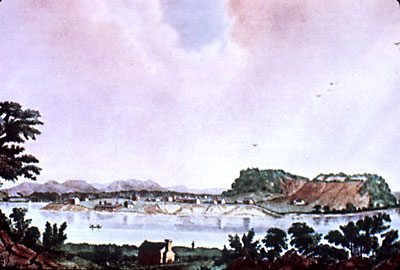
| GRANDFATHER'S FLOWER CHILD |
|
|
|
THE EMPTY NEST
One of the saddest experiences in this life is the breaking up of home. A married couple begin house-keeping. Two sit down a little awkwardly to the table. In the course of years a long table is required for eight or a dozen. Little curly heads are tucked away at night. In the morning they are still there. The parents slept soundly because they knew where they were. But the years come and go. The little ones grow up. Like young birds, they begin to fly. Soon the nest becomes empty, and two disconsolate people, no longer youthful, sit down to a shortened table. The appetite is not as keen, nor the sleep as sound. There is a feeling of emptiness which is painful. But such is the end of every home. It becomes only walls and roof. This now is the case in the parsonage. The birds have flown. The old nest is vacant like many robins' home that we will see this winter hanging on the bare trees, filled with snow, a melancholy sight, and symbol of human life. Earl, the first born, is in Milwaukee, editor and teacher of Journalism, as well as choir leader and flutist. Two little girls, Janet and Geraldine, boss him around. Orlena lives at Littlestown, this state, and her two boys, Phillip and Kenneth, keep her busy. Eugene, whom other people call Jack, lives in York and may be seen every day at the electric office or walking with little Lois on the way to Grandma's. Theda is among the unfading flowers of the summer land of eternal song where there is no autumn of falling leaves, or birdless gardens, or tearful eyes. Ray is in his last year of Seminary, learning the theory of preaching, which he hopes to put into practise in a year after this. Baby Florence is Conservatory of Music all absorbed in that beautiful art of which the angels are masters. Thus their friends know where they are and what they are doing. All children nowadays have good opportunities to beat their parents. This seems to be the purpose of parenthood. But the old home must lose them in order that they may be useful to the world. So it is well, but loneliness is a hardship for the human heart. ---by Adam Stump, in the Parish Telephone, York, 1913 |
|
FOUR SCORE The following is an excerpt from a letter written by Emma Yount Stumpf, aged 80 years, to her son in recalling historic events in her life 73 years earlier. |
|
Dear Ray,
You want me to tell you about my
throwing a Boquet to President Lincoln. It was the time he visited
Gettysburg and made that Memorable speech. How little we knew at that
time, that the speech of the Great Man would never be forgotten. He was
entertained |

| home | next page |
 a comely blue-eyed brunette
who gave her male customers smiles as saccharine as the confections she
sold. Girls' screams fell from the Ferris wheel. At the hoop-tossing
game, a girl was winning from her boyfriend who very wisely was not
doing his best. Passing the merry-go-round, I came to the refreshment
stand which marked the end of the circuit. I ordered a hot dog and an
orange drink and while I waited I reflected that human beings were
still acting like human beings.
a comely blue-eyed brunette
who gave her male customers smiles as saccharine as the confections she
sold. Girls' screams fell from the Ferris wheel. At the hoop-tossing
game, a girl was winning from her boyfriend who very wisely was not
doing his best. Passing the merry-go-round, I came to the refreshment
stand which marked the end of the circuit. I ordered a hot dog and an
orange drink and while I waited I reflected that human beings were
still acting like human beings.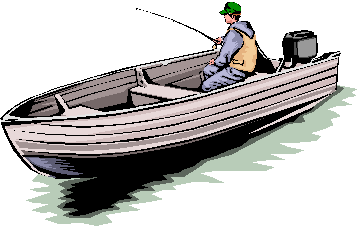 I will go fishing anytime I have the opportunity to do so. It is my
favorite outdoor sport. When I prepare for a fishing trip I do not
overload myself with fancy equipment. Pole, line and hooks are
sufficient for me because I never care whether I catch any fish or not.
My main pleasure is stretching out in the boat and forgetting
------forgetting every worry I have, no matter how trivial. The
swiftly-moving current slips by the boat and into it I throw all my
troubles and they are carried far downstream. I know I shall find them
again, but for now they are lost. The stream races past. It reminds me
of the hustling life I usually lead. Today I am not going along with
that life. I am anchored against it, taking time out. Why do I leave
the line in the water? I want no fish. Perhaps it signifies a link with
the speedy living to which I must return. Now I shall reel in the line
and lift the anchor. Maybe next time I shall bring along some bait.
I will go fishing anytime I have the opportunity to do so. It is my
favorite outdoor sport. When I prepare for a fishing trip I do not
overload myself with fancy equipment. Pole, line and hooks are
sufficient for me because I never care whether I catch any fish or not.
My main pleasure is stretching out in the boat and forgetting
------forgetting every worry I have, no matter how trivial. The
swiftly-moving current slips by the boat and into it I throw all my
troubles and they are carried far downstream. I know I shall find them
again, but for now they are lost. The stream races past. It reminds me
of the hustling life I usually lead. Today I am not going along with
that life. I am anchored against it, taking time out. Why do I leave
the line in the water? I want no fish. Perhaps it signifies a link with
the speedy living to which I must return. Now I shall reel in the line
and lift the anchor. Maybe next time I shall bring along some bait. bad weather. You are then
climbing up through the foggy prison of gray and finally bursting out
into the freedom of a dazzling panorama. The darkness which you have
just left suddenly transforms into a billowy, rolling, slowly churning
carpet of whiteness which seems to be figured in other shades of white.
Above, the limitless ceiling of crystal blue. Hanging higher somewhere
in unbounded space is the fiery orb Sun, symbol of man's hope for
tomorrow. There you are in the midst of it all. The combined troubles
of all men are as a grain of sand in comparison to this vast evidence
of provision for man's physical, mental and spiritual good. When one is
placed in such overpowering environs, sad or evil thoughts are
impossible. Consequently, when you are downcast by darkened skies, use
the inner vision of your imagination. Lift your body, mind and spirit
to some invisible platform in the upper regions of splendorous purity.
bad weather. You are then
climbing up through the foggy prison of gray and finally bursting out
into the freedom of a dazzling panorama. The darkness which you have
just left suddenly transforms into a billowy, rolling, slowly churning
carpet of whiteness which seems to be figured in other shades of white.
Above, the limitless ceiling of crystal blue. Hanging higher somewhere
in unbounded space is the fiery orb Sun, symbol of man's hope for
tomorrow. There you are in the midst of it all. The combined troubles
of all men are as a grain of sand in comparison to this vast evidence
of provision for man's physical, mental and spiritual good. When one is
placed in such overpowering environs, sad or evil thoughts are
impossible. Consequently, when you are downcast by darkened skies, use
the inner vision of your imagination. Lift your body, mind and spirit
to some invisible platform in the upper regions of splendorous purity.
 As
at the time of the Bishop drowning, there were many youths on the bank
looking at the struggling of the man to keep from drowning, but no
attempt, until the arrival of Stump, was made to rescue him. Those who
saw the man trying to regain the shore stated that they could not swim
well enough to attempt the rescue.
As
at the time of the Bishop drowning, there were many youths on the bank
looking at the struggling of the man to keep from drowning, but no
attempt, until the arrival of Stump, was made to rescue him. Those who
saw the man trying to regain the shore stated that they could not swim
well enough to attempt the rescue. salesperson. He bought the
deluxe American history volume and put it in a drawer of his office
desk. And he did one more thing; he presently forgot about the book and
never again looked at it.
salesperson. He bought the
deluxe American history volume and put it in a drawer of his office
desk. And he did one more thing; he presently forgot about the book and
never again looked at it.

 Born in 1891, the fifth of six children, Theda was early doomed to a
shortened life. That is evidently why she was looked on with special
favor by the other family members. She was quite close to her brother
Ray who was just three years her senior. By 1910 Ray was working as a
reporter for the local newspaper. Whether Theda was totally bedridden
at this time or whether she was just sick with a recently acquired
malady is not known. As tol
Born in 1891, the fifth of six children, Theda was early doomed to a
shortened life. That is evidently why she was looked on with special
favor by the other family members. She was quite close to her brother
Ray who was just three years her senior. By 1910 Ray was working as a
reporter for the local newspaper. Whether Theda was totally bedridden
at this time or whether she was just sick with a recently acquired
malady is not known. As tol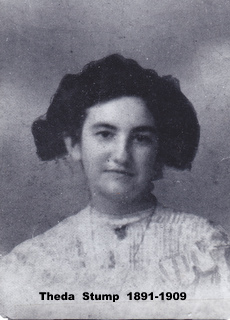 d many times in his later life Ray was
lolling at a downtown cigar store one evening. He normally made such
contacts to pick up news items. This particular night he began to have
doleful feelings. As misgivings grew in his mind, he informed the
proprietor that he just had to go home at once. Out in the street he
caught the last streetcar. With the insistent urge still prodding him,
Ray alit from the trolley, ran into his house and vaulted up the stairs
to his sister's room. He arrived beside Theda's bed and was very
shortly witness to her passing from this life.
d many times in his later life Ray was
lolling at a downtown cigar store one evening. He normally made such
contacts to pick up news items. This particular night he began to have
doleful feelings. As misgivings grew in his mind, he informed the
proprietor that he just had to go home at once. Out in the street he
caught the last streetcar. With the insistent urge still prodding him,
Ray alit from the trolley, ran into his house and vaulted up the stairs
to his sister's room. He arrived beside Theda's bed and was very
shortly witness to her passing from this life. 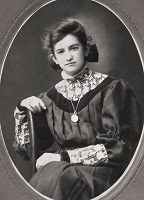
 At 31 years of age in 1885, Grandfather S. took his family to North
Platte, NE, where he labored for the Lord as a Home Missionary. A
rather sad event occurred during his term of five years. One Andrew
Sillasen drank part of a bottle of carbolic acid which he mistakenly
thought was his medicine. This happened in the dark of night at a
nearby ranch. Good Mrs. Coker and others tried in vain to save his
life. Grandfather conducted a cowboy funeral from the Lutheran Church.
Grandmother sang a solo. Andrew's favorite cow pony, which carried his
empty saddle, was led behind the hearse.
At 31 years of age in 1885, Grandfather S. took his family to North
Platte, NE, where he labored for the Lord as a Home Missionary. A
rather sad event occurred during his term of five years. One Andrew
Sillasen drank part of a bottle of carbolic acid which he mistakenly
thought was his medicine. This happened in the dark of night at a
nearby ranch. Good Mrs. Coker and others tried in vain to save his
life. Grandfather conducted a cowboy funeral from the Lutheran Church.
Grandmother sang a solo. Andrew's favorite cow pony, which carried his
empty saddle, was led behind the hearse. at the house of Laver Wills about one block from my home.
But
when I threw the flowers, he was seated at an open window in the
train which was to take him back to Washington. I stood right under his
window, and tried to throw the flowers in but was not quite tall enough
to reach so high, so a girl standing by my side helped me to get them
in. I was young and thoughtless, so do not remember if he accepted them
with words or bow. There were hundreds standing around, so there was
great noise so I could not have heard anyway.
at the house of Laver Wills about one block from my home.
But
when I threw the flowers, he was seated at an open window in the
train which was to take him back to Washington. I stood right under his
window, and tried to throw the flowers in but was not quite tall enough
to reach so high, so a girl standing by my side helped me to get them
in. I was young and thoughtless, so do not remember if he accepted them
with words or bow. There were hundreds standing around, so there was
great noise so I could not have heard anyway.